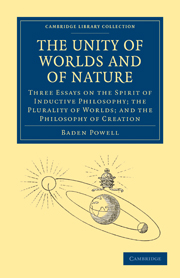 The Unity of Worlds and of Nature
The Unity of Worlds and of Nature PREFACE TO THE FIRST EDITION
Published online by Cambridge University Press: 29 August 2010
Summary
The three following essays, though somewhat connected in subject, are yet each distinct and complete in themselves, having been originally composed at different times and with separate objects. Hence there will probably be found in some parts repetitions: but on the whole it appeared preferable to allow these to remain, rather than by omissions and alterations to render less complete and continuous the argument of each essay in itself. And the few topics which belong to them in common will, in most, cases, be found treated under somewhat different aspects, according as the particular argument in each instance required.
The First Essay consists mainly of an amplification of a few paragraphs in my paper “on Necessary and Contingent Truth” in the Oxford Ashmolean Memoirs, 1849, in reference to which I felt it desirable to explain and illustrate more fully some points there but imperfectly treated; as well as some other topics related to them, and which have of late years been the subject of considerable discussion: some of which were also considered in my work on “the Connexion of Natural and Divine Truth,” 1838. More precisely, the subjects of the primary grounds of inductive reasoning, and the theory of Causation, have long since appeared to me to be commonly involved in much confusion of thought, which has, as I think, been rather increased than diminished by some recent discussions from which we might have hoped for greater enlightenment; — and which appears to me to be the source of many unhappy difficulties and objections connected with the so-called doctrine of “final causes,” and the evidences of natural theology generally.
- Type
- Chapter
- Information
- The Unity of Worlds and of NatureThree Essays on the Spirit of Inductive Philosophy; the Plurality of Worlds; and the Philosophy of Creation, pp. vii - xiiPublisher: Cambridge University PressPrint publication year: 2009First published in: 1856


